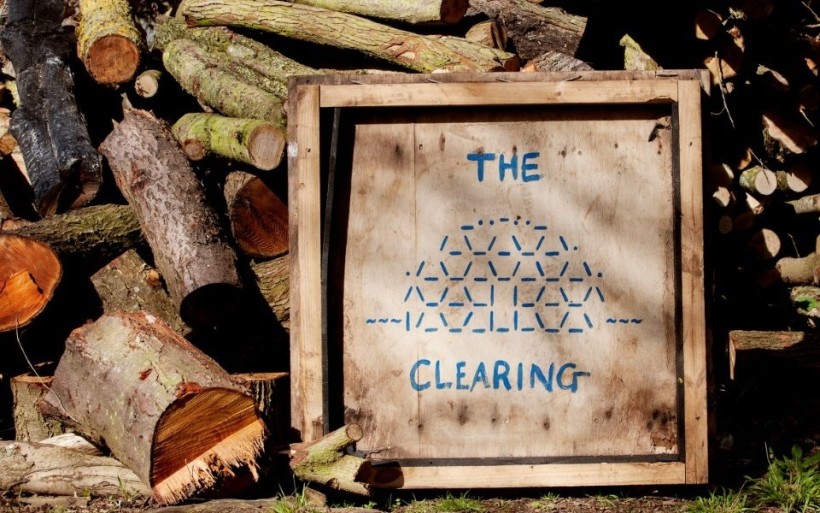
City AM’s Steve Dinneen spends a week as caretaker at Alex Hartley’s The Clearing
Going off the grid: What I learned after a week without technology in an “apocalypse dome”. By Steve Dinneen
"Smartphones are the new cigarettes,” screams one headline. “Why smartphones are making you ill,” warns another. Virtually everyone who lives in a city bemoans being connected to thousands of other human beings from the second they wake to the moment they fall asleep.
My relationship with technology is especially ambivalent. I fill every second of every day with some form of sensory input. John Humphrys’ voice wakes me in the morning; I listen to podcasts on the commute into the office; I check Twitter obsessively throughout the day; Sky News drones away in the background while I work; I fall asleep listening to an audio-book. It’s exhausting.
I’d estimate that 80 per cent of fights between my partner and I stem from one of us checking our phone; it’s infuriating to see your own flaws reflected back at you in another person, a brief glimpse into the black mirror of your own digital addiction. Like many modern households, we intermittently enforce rules – “No phones in the bedroom”, “No phones after 9pm” – but the fundamental issue, that we instinctively check social media at least once every 10 minutes, goes unchecked.
The barrage is incessant, yet I tell myself it’s necessary to my professional and social wellbeing, that without it I’d fall out of the loop, be poorer for my lack of a considered opinion on whether it’s okay to discuss Theresa May’s shoes. So I went cold turkey. Not just from social media, but from everything and everyone, living alone and off the grid, to see if I would lose my grip on reality like Jack Torrance in The Shining, or have some messianic epiphany about how we could all live Better Lives.
A project called The Clearing gave me the platform. It’s the brainchild of artists Alex Hartley – best known for towing a big rock from the Arctic to the south coast of England and declaring it an independent nation – and Tom James. They built a geodesic dome in the grounds of the beautiful Compton Verney estate a few miles outside Leamington Spa, hoping to make people think about how we might all have to live if we run out of fossil fuels or nuke each other into oblivion.
- Doug Aitken
- Njideka Akunyili Crosby
- Milton Avery
- Jules de Balincourt
- Ali Banisadr
- Hernan Bas
- María Berrío
- Saskia Colwell
- Verne Dawson
- Stan Douglas
- Elmgreen & Dragset
- Inka Essenhigh
- Ian Hamilton Finlay
- David Harrison
- NS Harsha
- Alex Hartley
- Secundino Hernández
- Ilse D’Hollander
- Christian Holstad
- Kudzanai-Violet Hwami
- Chantal Joffe
- Isaac Julien
- Idris Khan
- Yayoi Kusama
- John Kørner
- Doron Langberg
- Wangechi Mutu
- Alice Neel
- Maria Nepomuceno
- Chris Ofili
- Jorge Pardo
- Celia Paul
- Grayson Perry
- Paula Rego
- Tal R
- Conrad Shawcross
- Hedda Sterne
- Do Ho Suh
- Sarah Sze
- Adriana Varejão
- Stephen Willats
- Flora Yukhnovich
- Doug Aitken
- Njideka Akunyili Crosby
- Milton Avery
- Jules de Balincourt
- Ali Banisadr
- Hernan Bas
- María Berrío
- Saskia Colwell
- Verne Dawson
- Stan Douglas
- Elmgreen & Dragset
- Inka Essenhigh
- Ian Hamilton Finlay
- David Harrison
- NS Harsha
- Alex Hartley
- Secundino Hernández
- Ilse D’Hollander
- Christian Holstad
- Kudzanai-Violet Hwami
- Chantal Joffe
- Isaac Julien
- Idris Khan
- Yayoi Kusama
- John Kørner
- Doron Langberg
- Wangechi Mutu
- Alice Neel
- Maria Nepomuceno
- Chris Ofili
- Jorge Pardo
- Celia Paul
- Grayson Perry
- Paula Rego
- Tal R
- Conrad Shawcross
- Hedda Sterne
- Do Ho Suh
- Sarah Sze
- Adriana Varejão
- Stephen Willats
- Flora Yukhnovich
Victoria Miro Venice
San Marco 1994,
Calle Drio La Chiesa
30124 Venice, Italy
t: +39 041 523 3799
info@victoria-miro.com
View map
Opening Times
During exhibitions:
London: Tuesday–Saturday: 10am–6pm.
Venice: Tuesday–Saturday: 10am–1pm & 2–6pm.
We are also closed on Sundays, Mondays and public holidays.
Admission free.
Enquiries
All general enquiries should be sent to
info@victoria-miro.com
Victoria Miro does not accept unsolicited artist applications.
Before contacting or subscribing please read our Privacy Policy
We respect the choices you make about how you would like to hear from us. You will find links at the bottom of all emails we send from our mailing list which allow you to Update your preferences to change the way we contact you, or Unsubscribe if you want to opt out.
Read our Modern Slavery Statement here.
Read our sustainability statement here.
Subscribe
Staff contact details
Directors
Sales
Exhibitions
Communications
Operations
Technical Services
Finance
This website uses cookies
This site uses cookies to help make it more useful to you. Please contact us to find out more about our Cookie Policy.